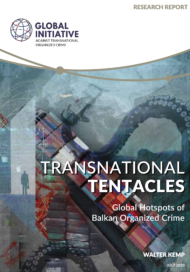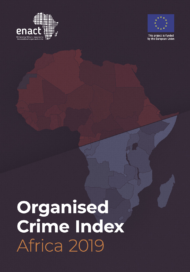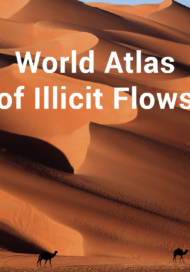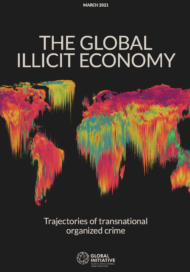Posted on 26 Apr 2021
Icelandic authorities are stepping up efforts to fight organized crime following a murder that has been linked to criminal gangs. The changing criminal dynamics in Iceland have now placed the country under the transnational organized crime lens.
Armando Beqiri, a 33-year-old of Albanian origin who had been living in Iceland for several years, was murdered outside his home in a residential street in Reykjavik on the evening of 13 February 2021. He was shot nine times with a handgun, but the neighbours didn’t hear a thing. Another Albanian, also a resident of Iceland, has confessed to police that he pulled the trigger.
The investigation that followed the murder was the most extensive and complex conducted by the Icelandic police to date, focusing on links to potential rivalry between organized crime groups in the country. Fourteen people were detained and, at one point, nine individuals were in custody. At the time of writing, only the self-confessed killer, reportedly 35-year-old Angjelin Sterkaj, remains under arrest and is expected to face a murder charge.
Police searched 17 locations, seizing phones, computers, cars, firearms and ammunition. Detectives spoke to multiple witnesses and analyzed communications data and surveillance footage. The people under investigation, many of whom may be indicted for various crimes, are of several nationalities, including Albanian, Icelandic, Romanian, Italian, Spanish, Portuguese, Estonian, Serbian, Lithuanian and Belarusian.
An execution-style murder such as this is practically unheard-of in Iceland and has prompted renewed discussion on the changing criminal landscape in the country and the rise of organized crime and its associated violence. Investigators are confident they have uncovered the motive for the murder, but when pressed by media they declined to offer further details.
The case is likely, however, to be linked to the criminal underworld. Sterkaj is wanted for robbery and related offences by Albanian authorities, who in 2015 requested his extradition, which was rejected by Iceland on the grounds that it did not fulfil legal requirements. Police confirmed that the victim also had ties to organized crime. It is clear that more than one person was involved in planning and carrying out the crime, and Icelandic authorities have been on guard for potential retribution for the murder.
The investigation has also focused on drug sales and distribution, and money laundering – criminal markets that constitute the core of organized crime activity in Iceland. One of the suspects in the investigation, Icelander Anton Kristinn Thorarinsson, has reportedly been one of the major drug kingpins in the country. However, police have not elaborated on his involvement in the case or his ties to the victim. Before the murder, Thorarinsson had found himself in a tight spot in the country’s underworld caused by a leak of confidential police material that exposed him as an informer for the police, providing law enforcement with information on his competitors.
In recent years, Icelandic police have repeatedly warned about the risks posed to the country by organized crime, and the Beqiri murder could be a warning signal. In a 2019 assessment report, the National Commissioner said this risk was ‘enormous’ – the highest on a four-stage risk-assessment scale. The report concluded that criminal groups in Iceland have considerable strength and resources, making it more difficult for police to counter their activities. As well as importing and selling drugs, these groups are also involved in financial crimes and money laundering.
Increased financial strength has allowed organized crime groups to acquire expertise to conceal their profits in legitimate business operations. Criminal groups in Iceland are also increasingly manufacturing narcotics, such as amphetamine, and working with foreign actors, for example from Poland, as revealed in a recent case.
Following Beqiri’s murder, the government announced that fighting organized crime is a priority in Iceland and that police will receive further funding. In an op-ed, Minister of Justice Áslaug Arna Sigurbjörnsdóttir wrote that 15 organized criminal groups currently operate in Iceland. Meanwhile, chief superintendent Karl Steinar Valsson said that Icelandic criminal groups operate around the world, in European countries such as Spain, the Netherlands, Germany, Italy and Denmark, and in Latin America. He said that the make-up of these groups is often ethnically mixed, and to pin organized crime in the country on foreign groups would be too simplistic, painting the Icelandic criminal landscape as more complex.
In her article, Sigurbjörnsdóttir wrote that police have already received considerable funds to fight this threat, legislation has been amended and focus has been put on better coordination and effective use of resources within the police force. She also announced that an additional 350 million kronur (€2.3 million) will be allocated to a dedicated law enforcement fund to strengthen the police in this fight. To date, the police have made some progress, specifically in indicting and getting defendants convicted for money laundering, which has resulted in the confiscation of illegal gains from drug dealing and other crimes.
Iceland is still one of the safest and most peaceful countries in the world, presenting low crime rates. The police maintain that the general public is not at risk despite this recent high-profile criminal case. Nevertheless, the murder and the upcoming trial will no doubt reveal more information about the rise of organized criminal groups in the country, increasing the pressure on authorities to take necessary measures in confronting the threat. One thing is clear: this volcanic island in the middle of the North Atlantic is seemingly connected to the global world of transnational organized crime.



